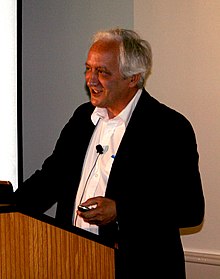Loading AI tools
From Wikipedia, the free encyclopedia
Charles Landry (born July 1, 1948) is an author and international adviser on the future of cities best known for popularising the Creative City concept. His book The Creative City: A Toolkit for Urban Innovators became a movement to rethink the planning, development and management of cities.[1]
This article may have been created or edited in return for undisclosed payments, a violation of Wikipedia's terms of use. It may require cleanup to comply with Wikipedia's content policies, particularly neutral point of view. (April 2020) |
Charles Landry | |
|---|---|
 Charles Landry in July 2011 | |
| Born | 1948 United Kingdom |
| Occupation | Writer, urban planner |
| Nationality | British |
| Subject | Urban planning |
| Literary movement | Comedia |
| Notable works | The Creative City: A Toolkit for Urban Innovators |
| Website | |
| charleslandry | |
He is credited for his attempt to rethink city making through his work on intercultural cities, the psychology of cities, creative bureaucracies and the measurement of creativity in cities – the latter developed with Bilbao and now assessed through in-depth studies of 25 cities.[2][3][4]
Charles Landry was born in 1948 and brought up and educated in Britain, Germany and Italy. Landry was born in London to German parents who had escaped from the Nazis. His father Harald was a philosopher and Nietzsche specialist and his mother an artist. He was educated at the Nymphenburger Gymnasium in Munich, Keele University in Staffordshire and Johns Hopkins in Bologna where he was assistant to Lord Robert Skidelsky. His dissertation was on problems of post-industrial society.[1]
Landry was assistant to Lord Kennet, a former Labour government minister, on the Europe Plus Thirty an EEC study on forecasting (1973-1974) commissioned by Lord Ralf Dahrendorf.[5] With colleagues he started Publications Distribution Cooperative in 1976, a company focused on distributing alternative literature and media for the then burgeoning system of non-mainstream publishers and bookshops.[6] In parallel he was a specialist bookseller focusing on radical publications.[7]
In 1978 he founded Comedia, a think tank, publisher and consultancy. Comedia undertook much of the early work highlighting the importance of cultural resources as well as a methodological framework and evidence for what is now known as the creative economy, formerly cultural industries. Its publishing programme provided some of the intellectual backdrop to the emergence of cultural studies, involving authors such as Dave Morley, Ken Worpole, Geoff Mulgan.[8] The provocative What a way to run a Railroad: An Analysis of Radical Failure (1985) assessed how the high failure rate of radical projects could be understood, but in the aftermath Landry was criticized as being ‘a left wing Thatcherite’.[9]
Throughout the 1980s and 1990s, Comedia supported a changing group of people developed projects concerned with urban life, culture and creativity and the future of cities including Franco Bianchini, Phil Wood, Sir Peter Hall, Jude Bloomfield and Naseem Khan. After producing more than 100 books Comedia publishing was sold to Routledge in 1988. Initially Comedia's publishing wing was most well known for research and projects on the future of cities. Later Comedia's research became better known with long term projects including Culture at the Crossroads,[10] The Art of Regeneration,[11] and Creativity at the Heart of Culture.[12][8]
Seamless Wikipedia browsing. On steroids.
Every time you click a link to Wikipedia, Wiktionary or Wikiquote in your browser's search results, it will show the modern Wikiwand interface.
Wikiwand extension is a five stars, simple, with minimum permission required to keep your browsing private, safe and transparent.